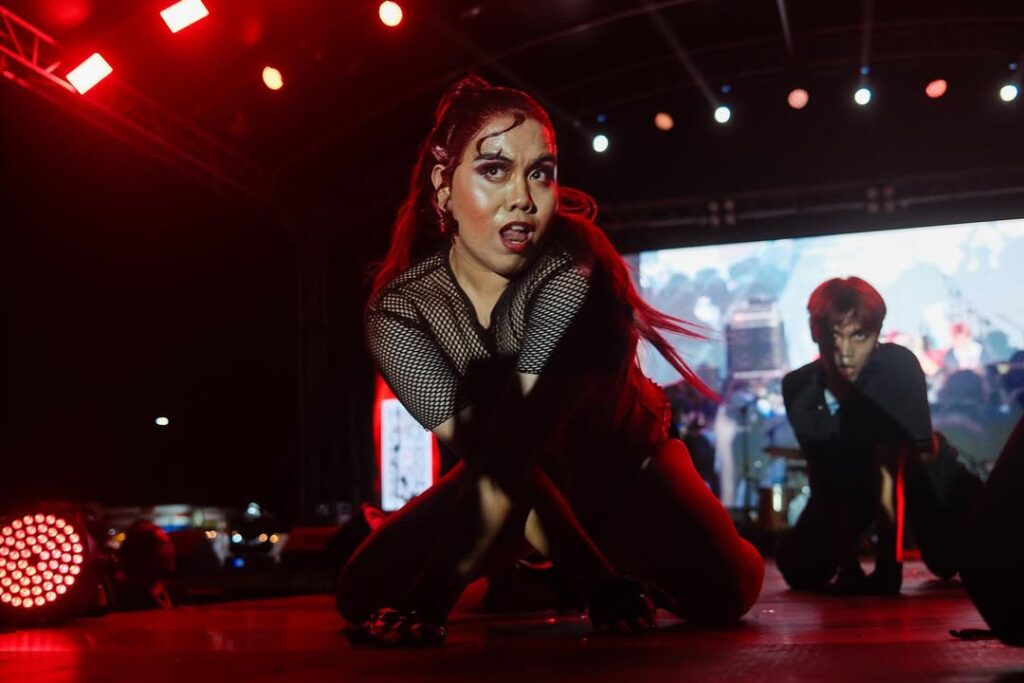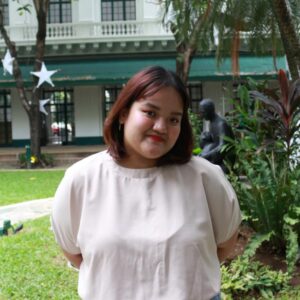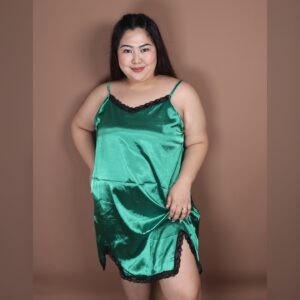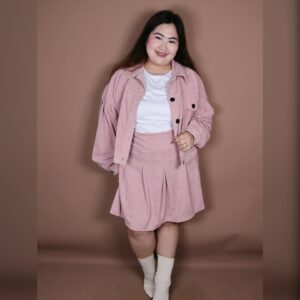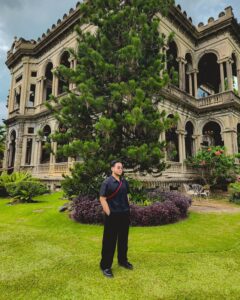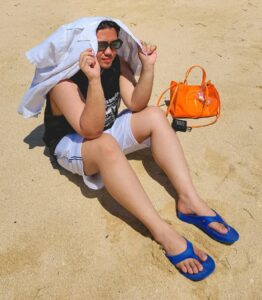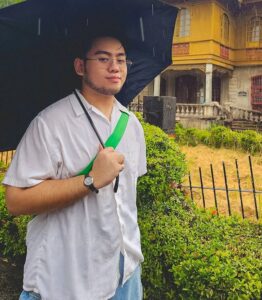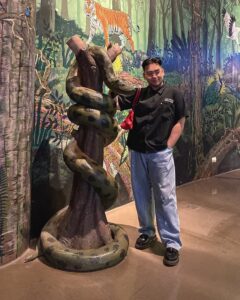“Sa akin, hindi lang ito tungkol sa fashion. Tungkulin ng platforms tulad ng Kurbatin na kilalanin ang katawan bilang espasyo ng laban at pagmamahal.”
– Darrion Mighuel D. Flores aka Veruchka Red, BA Philosophy student, drag artist, and fierce voice for fat justice.
At the height of the COVID-19 pandemic, Darrion Flores (he/him) found himself in front of a mirror, makeup brushes in hand, with trusted friends cheering him on over video call. That moment gave birth to Veruchka Red (she/her)—his bold, voluptuous drag persona now known for turning heads in university events and standing firm in political protests.
A student of Philosophy at UP Los Baños, Darrion doesn’t see drag as mere performance. It’s protest. It’s survival. It’s how he pushes back—not only against fatphobia and discrimination—but more importantly, against the cruel politics deeply rooted in the Philippines. In a country where queer, plus size bodies are often ridiculed, shamed, or erased, drag becomes his act of defiance. “Drag is my weapon against hate,” he says. And it shows: whether in class or on stage, Veruchka Red is a force that demands space and respect.
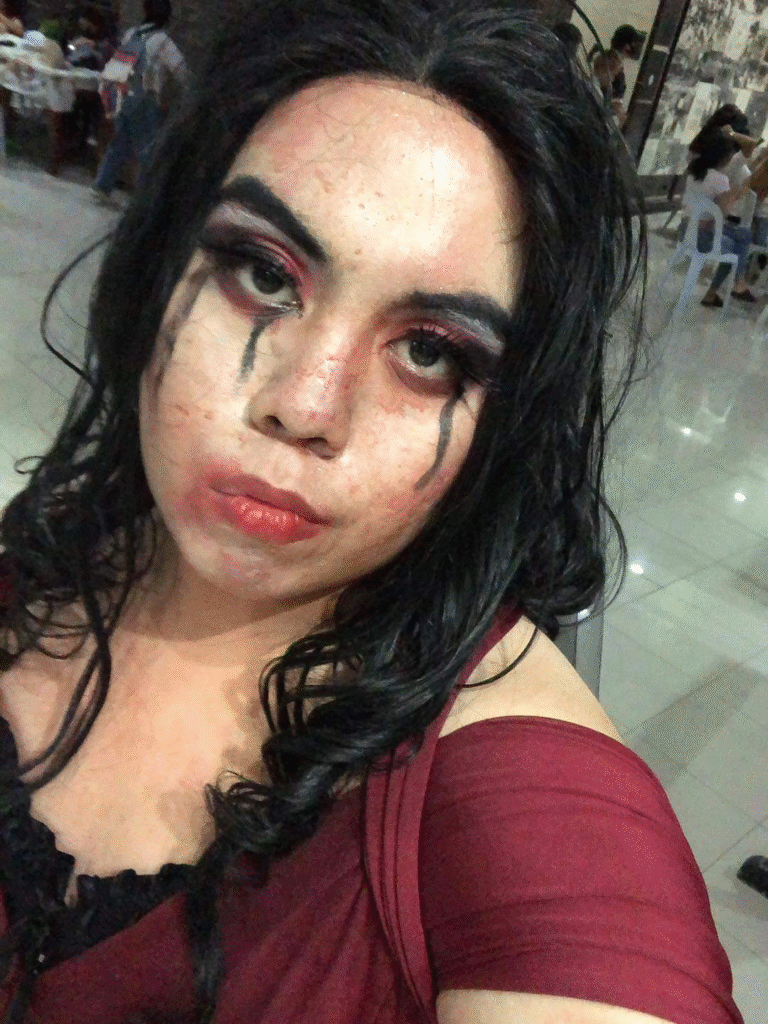
When Makeup Reveals More Than Skin
One of the most honest, raw moments Darrion shared was about makeup—a process that, for many drag artists, is a form of empowerment. But for plus size queens like Veruchka, it’s also where doubt can creep in.
He spoke about watching slim drag queens do their makeup online with effortless finesse, while he struggled. “Minsan napapatanong ako, may mali ba sa mukha ko? Sa katawan ko?” he asked. “Bakit parang sa kanila ang bilis mag-contour, pero sa akin hindi?”
The problem wasn’t the skill—it was the invisibility. Most makeup tutorials cater to thinner faces, narrower features, and rarely offer techniques or affirmations for bigger queens. What’s supposed to be a celebration of self becomes another space where larger bodies feel left out.
Yet despite this, Veruchka Red continues to paint her face, not to hide—but to reclaim. To insist: this body, this face, this queen is worthy of beauty, attention, and respect.

Beyond Fashion: Rights, Realities, and Representation
While Darrion praised Kurbatin for addressing body politics, fashion, and rights, he posed a critical question: “May proteksyon ba talaga sa Pilipinas para sa plus size?”
He pointed out how discrimination goes beyond the closet. From being charged double on public transportation to being overlooked in the workplace, plus size Filipinos face systemic neglect. These aren’t just fashion issues—they’re human rights issues.
To improve accessibility and empower users, Darrion suggested integrating practical tools into the site—like pop-up reminders about relevant consumer laws, easy-to-understand guides for reporting unethical sellers to the DTI, and checklists to help identify red flags when shopping online. For him, education must be actionable. Empowerment must be immediate.

The Stories We Need to Hear
Darrion believes Kurbatin’s power lies in its potential to humanize. “Fat shaming is normalized in Filipino families. We need to talk about that,” he said. He pushed for content grounded in our local realities—microaggressions from titas, mental health struggles, and resilience stories from plus size Filipinos in schools, workplaces, and healthcare settings.
He emphasized the need for narratives that don’t just share experiences but challenge the systems behind them. What is it like for a plus size professor navigating academia? Do fat artists receive the same opportunities and respect as their thinner peers? And perhaps most critically: why are there still so few legal protections in the Philippines against size-based discrimination?
By exploring these deeper, often ignored questions, Kurbatin can move from being simply informative to becoming truly transformative.

From Canvas to Cause
As a drag artist, Darrion knows that confidence doesn’t start with a product—it starts with a message. One line on a homepage, he says, could shift everything: You are worthy as you are. For someone struggling with body image, that could be the push they need to explore more, to believe more, to fight more.
And that’s what Kurbatin must do—offer both content and courage. Not just break stereotypes, but name injustices. Not just celebrate beauty, but affirm humanity.

Red, Radiant, and Revolutionary
Veruchka Red is not afraid to be loud, political, and beautiful. She struts through campus halls and marches in rallies, a living declaration that drag is not escapism—it’s confrontation. It’s care. It’s courage.
And Darrion Flores? He’s the thinker behind the lashes. The voice behind the rouge. The activist who reminds us that representation must be rooted in reality—and that the personal is always political.
With makeup as his mirror and drag as his megaphone, Darrion invites all of us to imagine a world where plus size, queer, Filipino bodies are not just seen—but celebrated.
Because whether in heels or in theory, he’s not just showing up. He’s showing the way.
Written by: Sam Aniceto

